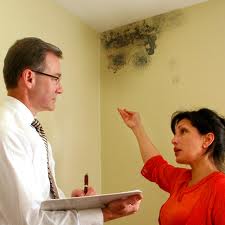- October 30, 2019
“My Landlord Won’t Fix My Mold Problem”
Over the years, one of the re-occuring situations that we see is landlords and tenants having disputes over mold. Both landlords and tenants come to us and request and inspection to either prove the other person wrong or figure out what needs to be done to fix the problem. We would like to start this article by saying the same thing that we tell clients in this situation looking for advice. MI&T is not a legal service and any advice we give is simply an opinion based on past experiences we have had. If you find yourself in a dispute with your landlord or tenant, please check your states laws on rights that you have in order to make a sound decision and avoid consequences that you may not like.

With that being said, our mold testing services do offer a lot of value to people that find themselves in this type of situation. First and foremost, bringing in an inspector to evaluate the property can act as mediation. Arguments about indoor mold growth are usually the tenant claiming there is a problem and the landlord saying there isn’t. Whenever there is a dispute where it is one person’s word against another, an unbiased third party can help. Not to mention after the inspection is complete and samples are analyzed, there will be concrete evidence proving whether or not a problem exists. Most of the time this offers a peaceful resolution and causes the other party to give in. Either the tenant stops claims about mold causing problems after an expert says there is not elevated conditions, or the landlord agrees to pay for the recommended repairs. Once again this is not legal advice, but we have seen the method below work very well. Email is recommended over phone calls so you have documentation of everything.
-
Write Email to Landlord expressing your concerns and request having a mold inspector come out to perform testing. Mention that MI&T does not perform mold removal so there is no risk of the inspector trying to exaggerate problems.
-
If Landlord does not comply, take it upon yourself to hire us and perform the assessment. You may wish to send another email explaining you are doing so and mention that you plan to deduct the cost of the inspection from next month’s rent in the event a mold problem is in fact present.
-
If results indicate a problem, present the report to them. 19 times out of 20 this will be enough to get them to address it properly.
-
On the off chance your landlord still wants to ignore the problem, you now have proof of the issue and will have more of a leg to stand on if you withhold rent or break a lease.
Unfortunately, we do run into situations when the landlord or building manager refuses to make repairs even after an inspection has proven a problem exists. This is where things can get a little hairy. If you find yourself in this type of situation, we highly suggest that you get the advice of an attorney or someone familiar with state laws prior to making any drastic decisions. You need to find out what rights you have and go from there. Are there any laws about mold and inhabitable conditions pertaining to breaking a lease? Do you have the right to withhold rent? If you live in a building, are there other units experiencing similar problems? These are all things that you should find out before taking the next step.

If your dispute goes far enough that it ends up in a courtroom, having an inspection complete with mold testing is crucial in terms of being taken seriously. Unless you show up with evidence of what you are claiming, your argument will hold zero weight in court and you will lose. If necessary and requested, an inspector from MI&T can serve as an expert witness and explain their findings from the inspection performed.
If you find yourself in a situation like this and would like to use our service in an attempt to mitigate the situation, give us a call at 855-600-6653.

